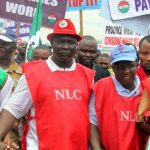A former governorship aspirant in Edo State, Victoria Amu has called on the Federal Government and labour unions to urgently resolve the ongoing minimum wage dispute to prevent another disruptive nationwide strike.
In light of the pressing economic and social challenges facing the nation, Ms. Amu emphasises the critical need for constructive dialogue and a balanced solution that addresses the concerns of both workers and employers.
“Achieving a fair and sustainable minimum wage is not just a matter of economic policy, but a fundamental issue of social justice and national stability,” Ms. Amu stated. “It is imperative that the FG and labor unions come together to find common ground that ensures a livable wage for workers while considering the financial realities faced by businesses.”
She highlights the key points of the call to action to include:
*Immediate and Inclusive Dialogue*
Ms. Amu calls for the urgent convening of dialogue sessions involving all stakeholders—government representatives, labor unions, employers, and economic experts—to facilitate a transparent and fair negotiation process.
*Phased Wage Increases:*
Proposing a phased approach to increasing the minimum wage, Ms. Amu suggests that this method will allow businesses to adjust gradually while improving workers’ earnings over time.
*Economic Impact Assessments:*
Comprehensive economic impact assessments and cost of living surveys should inform the decision-making process to ensure that the new minimum wage is both fair and feasible.
*Support for Businesses:*
The introduction of financial support measures, such as tax incentives and subsidies, is crucial to help businesses, especially small and medium-sized enterprises (SMEs), manage the transition to higher wages without reducing their workforce.
*Enhanced Social Safety Nets:*
To complement wage increases, Ms. Amu advocates for improved public services and expanded direct support programs for low-income families, reducing the overall cost of living and enhancing workers’ quality of life.
*Transparency and Communication:*
Clear and transparent communication from the FG regarding the steps being taken and the rationale behind decisions is essential to build trust and ensure public understanding and support.
*Long-Term Economic Policies:*
Ms. Amu emphasizes the importance of policies aimed at economic diversification, job creation, and skills development to foster a robust and resilient economy.
Conclusively, Victoria Amu urges all parties to prioritise the resolution of the minimum wage issue through constructive and inclusive dialogue, focusing on shared goals of economic stability and social equity. By working together, the FG and labour unions can avoid another nationwide strike, ensuring that the needs of workers are met while supporting the health and sustainability of businesses.
“We must act now to build a future where every worker earns a wage they can live on, and every business can thrive,” Ms. Amu concluded. “Only through cooperation and commitment can we achieve a solution that benefits all Nigerians.”
A former governorship aspirant in Edo State, Victoria Amu has called on the Federal Government and labour unions to urgently resolve the ongoing minimum wage dispute to prevent another disruptive nationwide strike.
In light of the pressing economic and social challenges facing the nation, Ms. Amu emphasises the critical need for constructive dialogue and a balanced solution that addresses the concerns of both workers and employers.
“Achieving a fair and sustainable minimum wage is not just a matter of economic policy, but a fundamental issue of social justice and national stability,” Ms. Amu stated. “It is imperative that the FG and labor unions come together to find common ground that ensures a livable wage for workers while considering the financial realities faced by businesses.”
She highlights the key points of the call to action to include:
*Immediate and Inclusive Dialogue*
Ms. Amu calls for the urgent convening of dialogue sessions involving all stakeholders—government representatives, labor unions, employers, and economic experts—to facilitate a transparent and fair negotiation process.
*Phased Wage Increases:*
Proposing a phased approach to increasing the minimum wage, Ms. Amu suggests that this method will allow businesses to adjust gradually while improving workers’ earnings over time.
*Economic Impact Assessments:*
Comprehensive economic impact assessments and cost of living surveys should inform the decision-making process to ensure that the new minimum wage is both fair and feasible.
*Support for Businesses:*
The introduction of financial support measures, such as tax incentives and subsidies, is crucial to help businesses, especially small and medium-sized enterprises (SMEs), manage the transition to higher wages without reducing their workforce.
*Enhanced Social Safety Nets:*
To complement wage increases, Ms. Amu advocates for improved public services and expanded direct support programs for low-income families, reducing the overall cost of living and enhancing workers’ quality of life.
*Transparency and Communication:*
Clear and transparent communication from the FG regarding the steps being taken and the rationale behind decisions is essential to build trust and ensure public understanding and support.
*Long-Term Economic Policies:*
Ms. Amu emphasizes the importance of policies aimed at economic diversification, job creation, and skills development to foster a robust and resilient economy.
Conclusively, Victoria Amu urges all parties to prioritise the resolution of the minimum wage issue through constructive and inclusive dialogue, focusing on shared goals of economic stability and social equity. By working together, the FG and labour unions can avoid another nationwide strike, ensuring that the needs of workers are met while supporting the health and sustainability of businesses.
“We must act now to build a future where every worker earns a wage they can live on, and every business can thrive,” Ms. Amu concluded. “Only through cooperation and commitment can we achieve a solution that benefits all Nigerians.”
A former governorship aspirant in Edo State, Victoria Amu has called on the Federal Government and labour unions to urgently resolve the ongoing minimum wage dispute to prevent another disruptive nationwide strike.
In light of the pressing economic and social challenges facing the nation, Ms. Amu emphasises the critical need for constructive dialogue and a balanced solution that addresses the concerns of both workers and employers.
“Achieving a fair and sustainable minimum wage is not just a matter of economic policy, but a fundamental issue of social justice and national stability,” Ms. Amu stated. “It is imperative that the FG and labor unions come together to find common ground that ensures a livable wage for workers while considering the financial realities faced by businesses.”
She highlights the key points of the call to action to include:
*Immediate and Inclusive Dialogue*
Ms. Amu calls for the urgent convening of dialogue sessions involving all stakeholders—government representatives, labor unions, employers, and economic experts—to facilitate a transparent and fair negotiation process.
*Phased Wage Increases:*
Proposing a phased approach to increasing the minimum wage, Ms. Amu suggests that this method will allow businesses to adjust gradually while improving workers’ earnings over time.
*Economic Impact Assessments:*
Comprehensive economic impact assessments and cost of living surveys should inform the decision-making process to ensure that the new minimum wage is both fair and feasible.
*Support for Businesses:*
The introduction of financial support measures, such as tax incentives and subsidies, is crucial to help businesses, especially small and medium-sized enterprises (SMEs), manage the transition to higher wages without reducing their workforce.
*Enhanced Social Safety Nets:*
To complement wage increases, Ms. Amu advocates for improved public services and expanded direct support programs for low-income families, reducing the overall cost of living and enhancing workers’ quality of life.
*Transparency and Communication:*
Clear and transparent communication from the FG regarding the steps being taken and the rationale behind decisions is essential to build trust and ensure public understanding and support.
*Long-Term Economic Policies:*
Ms. Amu emphasizes the importance of policies aimed at economic diversification, job creation, and skills development to foster a robust and resilient economy.
Conclusively, Victoria Amu urges all parties to prioritise the resolution of the minimum wage issue through constructive and inclusive dialogue, focusing on shared goals of economic stability and social equity. By working together, the FG and labour unions can avoid another nationwide strike, ensuring that the needs of workers are met while supporting the health and sustainability of businesses.
“We must act now to build a future where every worker earns a wage they can live on, and every business can thrive,” Ms. Amu concluded. “Only through cooperation and commitment can we achieve a solution that benefits all Nigerians.”
A former governorship aspirant in Edo State, Victoria Amu has called on the Federal Government and labour unions to urgently resolve the ongoing minimum wage dispute to prevent another disruptive nationwide strike.
In light of the pressing economic and social challenges facing the nation, Ms. Amu emphasises the critical need for constructive dialogue and a balanced solution that addresses the concerns of both workers and employers.
“Achieving a fair and sustainable minimum wage is not just a matter of economic policy, but a fundamental issue of social justice and national stability,” Ms. Amu stated. “It is imperative that the FG and labor unions come together to find common ground that ensures a livable wage for workers while considering the financial realities faced by businesses.”
She highlights the key points of the call to action to include:
*Immediate and Inclusive Dialogue*
Ms. Amu calls for the urgent convening of dialogue sessions involving all stakeholders—government representatives, labor unions, employers, and economic experts—to facilitate a transparent and fair negotiation process.
*Phased Wage Increases:*
Proposing a phased approach to increasing the minimum wage, Ms. Amu suggests that this method will allow businesses to adjust gradually while improving workers’ earnings over time.
*Economic Impact Assessments:*
Comprehensive economic impact assessments and cost of living surveys should inform the decision-making process to ensure that the new minimum wage is both fair and feasible.
*Support for Businesses:*
The introduction of financial support measures, such as tax incentives and subsidies, is crucial to help businesses, especially small and medium-sized enterprises (SMEs), manage the transition to higher wages without reducing their workforce.
*Enhanced Social Safety Nets:*
To complement wage increases, Ms. Amu advocates for improved public services and expanded direct support programs for low-income families, reducing the overall cost of living and enhancing workers’ quality of life.
*Transparency and Communication:*
Clear and transparent communication from the FG regarding the steps being taken and the rationale behind decisions is essential to build trust and ensure public understanding and support.
*Long-Term Economic Policies:*
Ms. Amu emphasizes the importance of policies aimed at economic diversification, job creation, and skills development to foster a robust and resilient economy.
Conclusively, Victoria Amu urges all parties to prioritise the resolution of the minimum wage issue through constructive and inclusive dialogue, focusing on shared goals of economic stability and social equity. By working together, the FG and labour unions can avoid another nationwide strike, ensuring that the needs of workers are met while supporting the health and sustainability of businesses.
“We must act now to build a future where every worker earns a wage they can live on, and every business can thrive,” Ms. Amu concluded. “Only through cooperation and commitment can we achieve a solution that benefits all Nigerians.”
A former governorship aspirant in Edo State, Victoria Amu has called on the Federal Government and labour unions to urgently resolve the ongoing minimum wage dispute to prevent another disruptive nationwide strike.
In light of the pressing economic and social challenges facing the nation, Ms. Amu emphasises the critical need for constructive dialogue and a balanced solution that addresses the concerns of both workers and employers.
“Achieving a fair and sustainable minimum wage is not just a matter of economic policy, but a fundamental issue of social justice and national stability,” Ms. Amu stated. “It is imperative that the FG and labor unions come together to find common ground that ensures a livable wage for workers while considering the financial realities faced by businesses.”
She highlights the key points of the call to action to include:
*Immediate and Inclusive Dialogue*
Ms. Amu calls for the urgent convening of dialogue sessions involving all stakeholders—government representatives, labor unions, employers, and economic experts—to facilitate a transparent and fair negotiation process.
*Phased Wage Increases:*
Proposing a phased approach to increasing the minimum wage, Ms. Amu suggests that this method will allow businesses to adjust gradually while improving workers’ earnings over time.
*Economic Impact Assessments:*
Comprehensive economic impact assessments and cost of living surveys should inform the decision-making process to ensure that the new minimum wage is both fair and feasible.
*Support for Businesses:*
The introduction of financial support measures, such as tax incentives and subsidies, is crucial to help businesses, especially small and medium-sized enterprises (SMEs), manage the transition to higher wages without reducing their workforce.
*Enhanced Social Safety Nets:*
To complement wage increases, Ms. Amu advocates for improved public services and expanded direct support programs for low-income families, reducing the overall cost of living and enhancing workers’ quality of life.
*Transparency and Communication:*
Clear and transparent communication from the FG regarding the steps being taken and the rationale behind decisions is essential to build trust and ensure public understanding and support.
*Long-Term Economic Policies:*
Ms. Amu emphasizes the importance of policies aimed at economic diversification, job creation, and skills development to foster a robust and resilient economy.
Conclusively, Victoria Amu urges all parties to prioritise the resolution of the minimum wage issue through constructive and inclusive dialogue, focusing on shared goals of economic stability and social equity. By working together, the FG and labour unions can avoid another nationwide strike, ensuring that the needs of workers are met while supporting the health and sustainability of businesses.
“We must act now to build a future where every worker earns a wage they can live on, and every business can thrive,” Ms. Amu concluded. “Only through cooperation and commitment can we achieve a solution that benefits all Nigerians.”
A former governorship aspirant in Edo State, Victoria Amu has called on the Federal Government and labour unions to urgently resolve the ongoing minimum wage dispute to prevent another disruptive nationwide strike.
In light of the pressing economic and social challenges facing the nation, Ms. Amu emphasises the critical need for constructive dialogue and a balanced solution that addresses the concerns of both workers and employers.
“Achieving a fair and sustainable minimum wage is not just a matter of economic policy, but a fundamental issue of social justice and national stability,” Ms. Amu stated. “It is imperative that the FG and labor unions come together to find common ground that ensures a livable wage for workers while considering the financial realities faced by businesses.”
She highlights the key points of the call to action to include:
*Immediate and Inclusive Dialogue*
Ms. Amu calls for the urgent convening of dialogue sessions involving all stakeholders—government representatives, labor unions, employers, and economic experts—to facilitate a transparent and fair negotiation process.
*Phased Wage Increases:*
Proposing a phased approach to increasing the minimum wage, Ms. Amu suggests that this method will allow businesses to adjust gradually while improving workers’ earnings over time.
*Economic Impact Assessments:*
Comprehensive economic impact assessments and cost of living surveys should inform the decision-making process to ensure that the new minimum wage is both fair and feasible.
*Support for Businesses:*
The introduction of financial support measures, such as tax incentives and subsidies, is crucial to help businesses, especially small and medium-sized enterprises (SMEs), manage the transition to higher wages without reducing their workforce.
*Enhanced Social Safety Nets:*
To complement wage increases, Ms. Amu advocates for improved public services and expanded direct support programs for low-income families, reducing the overall cost of living and enhancing workers’ quality of life.
*Transparency and Communication:*
Clear and transparent communication from the FG regarding the steps being taken and the rationale behind decisions is essential to build trust and ensure public understanding and support.
*Long-Term Economic Policies:*
Ms. Amu emphasizes the importance of policies aimed at economic diversification, job creation, and skills development to foster a robust and resilient economy.
Conclusively, Victoria Amu urges all parties to prioritise the resolution of the minimum wage issue through constructive and inclusive dialogue, focusing on shared goals of economic stability and social equity. By working together, the FG and labour unions can avoid another nationwide strike, ensuring that the needs of workers are met while supporting the health and sustainability of businesses.
“We must act now to build a future where every worker earns a wage they can live on, and every business can thrive,” Ms. Amu concluded. “Only through cooperation and commitment can we achieve a solution that benefits all Nigerians.”
A former governorship aspirant in Edo State, Victoria Amu has called on the Federal Government and labour unions to urgently resolve the ongoing minimum wage dispute to prevent another disruptive nationwide strike.
In light of the pressing economic and social challenges facing the nation, Ms. Amu emphasises the critical need for constructive dialogue and a balanced solution that addresses the concerns of both workers and employers.
“Achieving a fair and sustainable minimum wage is not just a matter of economic policy, but a fundamental issue of social justice and national stability,” Ms. Amu stated. “It is imperative that the FG and labor unions come together to find common ground that ensures a livable wage for workers while considering the financial realities faced by businesses.”
She highlights the key points of the call to action to include:
*Immediate and Inclusive Dialogue*
Ms. Amu calls for the urgent convening of dialogue sessions involving all stakeholders—government representatives, labor unions, employers, and economic experts—to facilitate a transparent and fair negotiation process.
*Phased Wage Increases:*
Proposing a phased approach to increasing the minimum wage, Ms. Amu suggests that this method will allow businesses to adjust gradually while improving workers’ earnings over time.
*Economic Impact Assessments:*
Comprehensive economic impact assessments and cost of living surveys should inform the decision-making process to ensure that the new minimum wage is both fair and feasible.
*Support for Businesses:*
The introduction of financial support measures, such as tax incentives and subsidies, is crucial to help businesses, especially small and medium-sized enterprises (SMEs), manage the transition to higher wages without reducing their workforce.
*Enhanced Social Safety Nets:*
To complement wage increases, Ms. Amu advocates for improved public services and expanded direct support programs for low-income families, reducing the overall cost of living and enhancing workers’ quality of life.
*Transparency and Communication:*
Clear and transparent communication from the FG regarding the steps being taken and the rationale behind decisions is essential to build trust and ensure public understanding and support.
*Long-Term Economic Policies:*
Ms. Amu emphasizes the importance of policies aimed at economic diversification, job creation, and skills development to foster a robust and resilient economy.
Conclusively, Victoria Amu urges all parties to prioritise the resolution of the minimum wage issue through constructive and inclusive dialogue, focusing on shared goals of economic stability and social equity. By working together, the FG and labour unions can avoid another nationwide strike, ensuring that the needs of workers are met while supporting the health and sustainability of businesses.
“We must act now to build a future where every worker earns a wage they can live on, and every business can thrive,” Ms. Amu concluded. “Only through cooperation and commitment can we achieve a solution that benefits all Nigerians.”
A former governorship aspirant in Edo State, Victoria Amu has called on the Federal Government and labour unions to urgently resolve the ongoing minimum wage dispute to prevent another disruptive nationwide strike.
In light of the pressing economic and social challenges facing the nation, Ms. Amu emphasises the critical need for constructive dialogue and a balanced solution that addresses the concerns of both workers and employers.
“Achieving a fair and sustainable minimum wage is not just a matter of economic policy, but a fundamental issue of social justice and national stability,” Ms. Amu stated. “It is imperative that the FG and labor unions come together to find common ground that ensures a livable wage for workers while considering the financial realities faced by businesses.”
She highlights the key points of the call to action to include:
*Immediate and Inclusive Dialogue*
Ms. Amu calls for the urgent convening of dialogue sessions involving all stakeholders—government representatives, labor unions, employers, and economic experts—to facilitate a transparent and fair negotiation process.
*Phased Wage Increases:*
Proposing a phased approach to increasing the minimum wage, Ms. Amu suggests that this method will allow businesses to adjust gradually while improving workers’ earnings over time.
*Economic Impact Assessments:*
Comprehensive economic impact assessments and cost of living surveys should inform the decision-making process to ensure that the new minimum wage is both fair and feasible.
*Support for Businesses:*
The introduction of financial support measures, such as tax incentives and subsidies, is crucial to help businesses, especially small and medium-sized enterprises (SMEs), manage the transition to higher wages without reducing their workforce.
*Enhanced Social Safety Nets:*
To complement wage increases, Ms. Amu advocates for improved public services and expanded direct support programs for low-income families, reducing the overall cost of living and enhancing workers’ quality of life.
*Transparency and Communication:*
Clear and transparent communication from the FG regarding the steps being taken and the rationale behind decisions is essential to build trust and ensure public understanding and support.
*Long-Term Economic Policies:*
Ms. Amu emphasizes the importance of policies aimed at economic diversification, job creation, and skills development to foster a robust and resilient economy.
Conclusively, Victoria Amu urges all parties to prioritise the resolution of the minimum wage issue through constructive and inclusive dialogue, focusing on shared goals of economic stability and social equity. By working together, the FG and labour unions can avoid another nationwide strike, ensuring that the needs of workers are met while supporting the health and sustainability of businesses.
“We must act now to build a future where every worker earns a wage they can live on, and every business can thrive,” Ms. Amu concluded. “Only through cooperation and commitment can we achieve a solution that benefits all Nigerians.”













